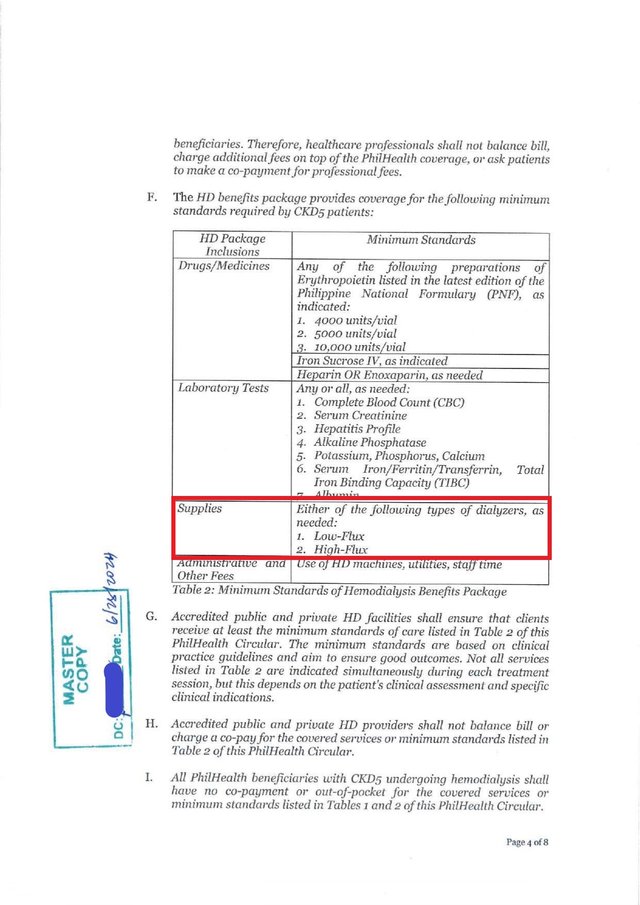
Why I can't get the full nice things?
One of the nurses yesterday had notified me along with other patients that the management of the dialysis clinic had finally brought the good news about the added benefits for dialysis patients coming from Philhealth about taking off the need for copay everytime we would get our dialysis treatment which was later clarified to be until the 156 allocated dialysis treatment sessions per year are all used up, then of course we will have to pay the succeeding sessions fully which is still a bit unclear for me like if we will pay a copay aside from paying the treatment session in full but I will soon shall see.
Anyway, with the copay out of the way, the patients can now breathe a sigh of relief for the reason that it is costing us an amount of exactly 4,000 PHP per month which is equivalent of $68.48 dollars at today's USD to PHP exchange rate which is a hefty cost which is now a thing of the past. Aside from getting that benefit, the patients can also get the two injections of EPO per week for patients which are opting-in for a three times treatment session per week while patients which are going for a two times dialysis per week can only receive a single injection of EPO per week. Well that is good for those patients which needs EPO injections but in my case I do not need them anymore because my body is already manufacturing its own EPO somewhere and it could be a bad thing for me to take an artificial EPO because it might shutdown my body's ability to produce EPO and make me rely on it afterwards which actually worries me than making me happy.
Those added benefits plus a monthly complete blood count (CBC) test and regular every six months hepatitis profile test without charge will be included in the package. The CBC test just costs a little while the latter is only required for those patients which are not infected by any hepatitis virus and the hepatitis test is required for them to do for the reason of safety so that other dialysis patients will not get the risk of being infected because in reality there is a risk because of the regular exposure of such patients to any virus for that matter.
Now the caveat

This issue still remains to a problem.
I also got another text message from the nurse which is assigned to notify the patients for their schedules and things like these clarifying that about the business of changing dialyzers will remain "as is", which I believe means that I will still have to pay a copay of 1,000 pesos or an equivalent of $17.12 if I would opt-in to use a high flux dialyzer and then paying it in full after using the first one within a current month which will cost me 2,200 PHP which is equivalent of $37.66 dollars. Considering that I only use two dialyzers per month, still paying in partial and in full doesn't give me justice. It is because the hospital will receive exactly PHP 48,000or an equivalent of $821.77 for my whole month of dialysis treatment which is twelve treatments and I can't get at least two dialyzers is quite a disappointment considering that it is included to be given free of charge as we can read in the rules as highlighted.

There should not be anymore copay for the dialyzer too and we can clearly see that on the implementing rules and regulations document for the new benefit to dialysis patients by Philhealth.
Now I will try to negotiate if I can trade-off my eight injections of EPO for getting two high flux dialyzers per month because of the reasons that I already stated. The thing is that the hospital's dialyzer is quite more expensive if I would purchase it from them whereas if I will source it from outside I can get at least some discount. I do not want to get overdosed with EPO because it will create a thick blood or too many red blood cells which can cause my dialyzer to get clogged-up and again, replacing it with a new one is not a very good outcome because of the cost of dialyzers. But I will have to again see if I needed such injections anymore based on laboratory test on my blood's red blood cell count and if it would result that I needed the injections then I will take it and shoulder the cost of the dialyzers but if the result of my CBC is good, I will have to make the trade-off if the authorities of the hospital that owns the dialysis clinic would agree to allow it for me.
Something has just happened that does not bother me at all and it involves people who are doing business by applying for free EPO from the charitable services of politicians and other political parties or wherever they can get free EPO and then selling those EPO injections to dialysis patients who need them. More often the same people are also dialysis patients who are still able to submit the required documents to politicians and the offices of upcoming politicians to make an application so that when they receive the particular EPO injections (other than applying for monetary aids), so that they can sell it and then the money they would earn would be used for their own expenses for their dialysis treatments, such as co-payment and purchase of dialyzers, etc. Now they will be out of business from now on because patients will already receive EPO for free which will make them to not need in purchasing EPO injections from these business people anymore where in cases from other dialysis clinics where even the dialyzer fee will also be given without co-pay, the need to buy them will also be reduced because not all dialysis clinics are giving it for free, so the demand for buying dialyzers will be curved from now on.
Translated in Spanish
Una de las enfermeras me informó ayer, junto con otros pacientes, de que la dirección de la clínica de diálisis había dado por fin la buena noticia de que Philhealth había añadido ventajas para los pacientes de diálisis, como la eliminación del copago cada vez que nos sometemos a un tratamiento de diálisis, y después de unos minutos me lo volvieron a notificar a través de otro mensaje de texto aclarándome que será efectivo hasta que se agoten las 156 sesiones de diálisis asignadas al año.
En cualquier caso, una vez eliminado el copago, los pacientes pueden respirar tranquilos, ya que nos cuesta exactamente 4.000 PHP al mes, lo que equivale a 68,48 USD al cambio actual de USD a PHP, un coste considerable que ya es cosa del pasado. Aparte de obtener ese beneficio, los pacientes también pueden obtener las dos inyecciones de EPO por semana para los pacientes que están optando por una sesión de tratamiento tres veces por semana, mientras que los pacientes que van para una diálisis dos veces por semana sólo puede obtener una sola inyección de EPO por semana. Bueno, eso es bueno para los pacientes que necesitan inyecciones de EPO, pero en mi caso ya no las necesito porque mi cuerpo ya está fabricando su propia EPO en algún lugar y podría ser algo malo para mí tomar una EPO artificial porque podría apagar la capacidad de mi cuerpo para producir EPO y hacerme dependiente de ella después, lo que en realidad me preocupa más de lo que me hace feliz.
El paquete incluye estas prestaciones añadidas, un hemograma completo mensual y un análisis semestral gratuito del perfil de hepatitis. El hemograma sólo cuesta un poco, mientras que este último sólo es necesario para aquellos pacientes que no están infectados por el virus de la hepatitis y el análisis de la hepatitis es necesario para ellos hacer por la razón de la seguridad para que otros pacientes en diálisis no tendrán el riesgo de ser infectados porque en realidad hay un riesgo debido a la exposición regular de estos pacientes a cualquier virus para el caso.
Ahora la salvedad
También recibí otro mensaje de texto de la enfermera que está asignada a notificar a los pacientes para sus horarios y cosas por el estilo aclarando que sobre el negocio de cambio de dializadores se mantendrá "como está", lo que creo que significa que todavía tendré que pagar un copago de 1.000 pesos o un equivalente de $ 17,12 si optara por utilizar un dializador de alto flujo y luego pagarlo en su totalidad después de usar el primero dentro de un mes en curso que me costará 2.200 PHP que es equivalente a $ 37,66 dólares. Teniendo en cuenta que sólo utilizo dos dializadores al mes, seguir pagando en parte y en su totalidad no me hace justicia. Es porque el hospital recibirá exactamente PHP 48.000 o un equivalente de $ 821,77 para todo mi mes de tratamiento de diálisis que es de doce tratamientos y no puedo obtener al menos dos dializadores es bastante una decepción teniendo en cuenta que se incluye para ser dado de forma gratuita como podemos leer en las reglas como se destaca.
Ahora intentaré negociar si puedo cambiar mis ocho inyecciones de EPO por dos dializadores de alto flujo al mes por las razones que ya he expuesto. El caso es que el dializador del hospital es bastante más caro si se lo compro a ellos, mientras que si lo compro fuera puedo conseguir al menos algún descuento. No quiero tener una sobredosis de EPO porque creará una sangre espesa o demasiados glóbulos rojos que pueden hacer que mi dializador se obstruya y, de nuevo, sustituirlo por uno nuevo no es un resultado muy bueno debido al coste de los dializadores. Pero tendré que volver a ver si necesito esas inyecciones basándome en un análisis de laboratorio sobre el recuento de glóbulos rojos de mi sangre y si el resultado es que necesito las inyecciones, entonces las aceptaré y asumiré el coste de los dializadores, pero si el resultado de mi hemograma es bueno, tendré que hacer el intercambio si las autoridades del hospital al que pertenece la clínica de diálisis están de acuerdo en permitírmelo.
Acaba de ocurrir algo que no me molesta en absoluto y se trata de personas que están haciendo negocio solicitando EPO gratuita a los servicios caritativos de políticos y otros partidos políticos o dondequiera que puedan conseguir EPO gratuita y luego vendiendo esas inyecciones de EPO a pacientes de diálisis que las necesitan. Más a menudo las mismas personas son también pacientes de diálisis que todavía son capaces de presentar los documentos requeridos a los políticos y las oficinas de los próximos políticos para hacer una solicitud para que cuando reciban las inyecciones de EPO particulares (aparte de solicitar ayudas monetarias), para que puedan venderlo y luego el dinero que ganarían sería utilizado para sus propios gastos para sus tratamientos de diálisis, tales como el copago y la compra de dializadores, etc. En el caso de otras clínicas de diálisis, en las que incluso el dializador se administra sin copago, la necesidad de comprarlo también se reducirá porque no todas las clínicas de diálisis lo administran gratuitamente, por lo que la demanda de dializadores se reducirá a partir de ahora.

I am of course thankful to God that these burdens are lifted off from my back and it had a great impact for the rest of other dialysis patients lives although from our dialysis clinic, we are still not totally free from paying because of the questionable payment for the use of dialyzers.

Upvoted! Thank you for supporting witness @jswit.
Downvoting a post can decrease pending rewards and make it less visible. Common reasons:
Submit